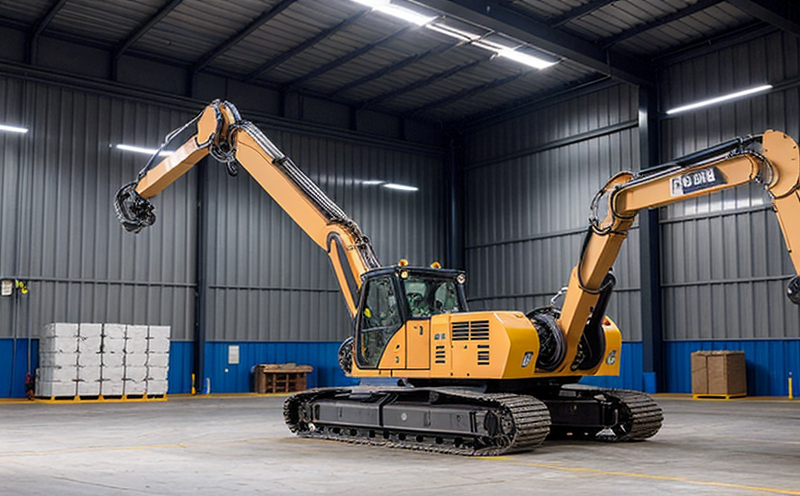Evaluating the mechanical integrity of robotic arms under heavy payloads
Evaluating the Mechanical Integrity of Robotic Arms Under Heavy Payloads Ensuring Safety and Efficiency in Industrial Operations
In todays fast-paced industrial landscape, robotic arms have become an integral part of manufacturing processes. These versatile machines can handle a wide range of tasks with precision and speed, from assembly to welding. However, their reliability and performance are only as good as their mechanical integrity. When subjected to heavy payloads, robotic arms require rigorous testing to ensure they operate within safety parameters.
This is where Eurolabs laboratory service comes in Evaluating the Mechanical Integrity of Robotic Arms Under Heavy Payloads. Our team of expert engineers and technicians uses state-of-the-art equipment to simulate real-world conditions, providing businesses with the assurance that their robotic arms can handle even the heaviest loads.
What is Evaluating the Mechanical Integrity of Robotic Arms Under Heavy Payloads?
Evaluating the mechanical integrity of robotic arms under heavy payloads involves a comprehensive analysis of an arms ability to withstand weight and stress without compromising its structural integrity. This includes assessing factors such as
Material fatigue
Stress concentrations
Vibration and resonance
Thermal expansion
Our team employs advanced methods, including finite element analysis (FEA), computational fluid dynamics (CFD), and experimental testing, to evaluate a robotic arms mechanical behavior under various loading conditions.
Why is Evaluating the Mechanical Integrity of Robotic Arms Under Heavy Payloads Essential?
Businesses that invest in robotic arms require assurance that these machines can operate safely and efficiently. A faulty or inadequately designed robotic arm can lead to costly downtime, equipment damage, and even workplace accidents. By evaluating a robotic arms mechanical integrity under heavy payloads, businesses can
Ensure Safety Prevent potential hazards and ensure compliance with industry regulations.
Optimize Performance Validate the design and performance of the robotic arm for maximum efficiency.
Reduce Maintenance Costs Identify potential issues before they cause costly downtime or damage.
Minimize Waste Reduce the risk of defective products due to mechanical failure.
Benefits of Evaluating the Mechanical Integrity of Robotic Arms Under Heavy Payloads
Here are some key benefits of our laboratory service
Comprehensive Analysis Our team conducts a thorough evaluation of the robotic arms mechanical behavior under various loading conditions.
Customized Solutions We work closely with clients to develop tailored testing protocols and recommendations for improvement.
Accurate Results Advanced equipment and expert analysis ensure precise results that accurately reflect real-world performance.
Quick Turnaround Time Our laboratory is equipped to provide fast turnaround times, minimizing downtime and getting your business back up and running quickly.
Cost Savings Identifying potential issues early on can save businesses thousands of dollars in maintenance costs and lost productivity.
How Does the Evaluation Process Work?
Our evaluation process involves several steps
Initial Consultation We work with clients to understand their specific needs and requirements.
Testing Protocol Development Our team develops a customized testing protocol based on the clients specifications.
Data Collection Advanced sensors and equipment collect data on the robotic arms behavior under various loading conditions.
Analysis and Reporting Our expert engineers analyze the collected data, providing detailed reports and recommendations for improvement.
QA Section
Q What types of robotic arms can be evaluated?
A We evaluate a wide range of robotic arms, including industrial robots, collaborative robots (cobots), and articulated robots.
Q How long does the evaluation process take?
A The duration of our laboratory service depends on the complexity of the project. Typically, evaluations are completed within 2-6 weeks.
Q What types of loading conditions can be simulated?
A We simulate a variety of loading conditions, including static loads, dynamic loads, and cyclic loading.
Q Can I witness the evaluation process in person?
A Yes, we welcome clients to observe the evaluation process at our laboratory.
Conclusion
Evaluating the mechanical integrity of robotic arms under heavy payloads is an essential step in ensuring safety, efficiency, and productivity in industrial operations. Eurolabs laboratory service provides businesses with a comprehensive analysis of their robotic arms behavior under various loading conditions. By partnering with us, you can ensure that your robotic arms operate within safety parameters, reducing the risk of costly downtime, equipment damage, and workplace accidents.
Dont compromise on the integrity of your robotic arms. Contact Eurolab today to schedule an evaluation and take the first step towards a safer, more efficient industrial operation.




